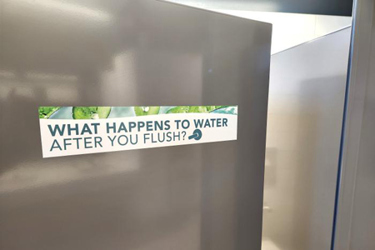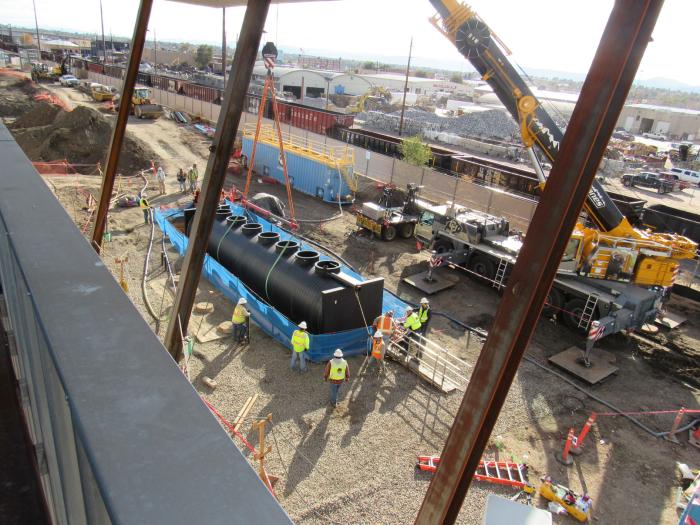Groundbreaking On-Site Water Recycling System Now Online

Denver Water HQ recycling, reusing water from sinks and bathrooms.
A groundbreaking effort to use, recycle, and reuse water — all at a single location — recently passed its last regulatory and operational hurdles and is fully operational at Denver Water’s Administration Building.
The system, dubbed RUFUS, short for ReUse For US, collects water from the six-story building’s toilets, urinals, sinks and the cafeteria. The collected water is cleaned by the RUFUS system and reused in the building’s toilets and urinals.
Denver Water’s RUFUS system is the first of its kind in Colorado to receive the stamp of approval from state health officials to collect, clean, and reuse water on-site.
“This is a big deal. This has never been done in Colorado, and it’s a testament to Denver Water’s leadership in conservation, innovation, and sustainability,” said Denver Water CEO/Manager Alan Salazar.
On-site reuse systems also operate in Washington, D.C., and several states, including California, Oregon, Washington, New York, Texas, Georgia, Virginia, Minnesota, and internationally.
The toilets and urinals in Denver Water’s Administration Building have been using recycled water cleaned by RUFUS since mid-February.
Reusing the RUFUS-treated water is a major piece of a multi-pronged water management effort that started in 2012 when Denver Water began to redevelop its 35-acre Operations Complex near downtown.

A tank, part of Denver Water's innovative on-site water capture and recycling facility, known as RUFUS, is lowered into place in October 2018. Photo credit: Denver Water
One of the redevelopment’s goals was to create a complex that would use and reuse water in multiple ways, a strategy called “One Water” — or using the right water for the right use and in turn reducing the reliance on drinking water for all uses.
“One of our objectives with the redevelopment was to celebrate water, sustainability and the rich history of Denver Water,” said Brian Good, Denver Water’s chief administrative officer who helped oversee the redevelopment work.
“And early on, we saw the redevelopment as an opportunity to demonstrate the future of sustainable urban water use in Colorado,” he said.
The Denver Water Operations Complex is designed to use and reuse water in three ways:
- Depressions in the landscape on the 35-acre complex capture and filter stormwater before it reaches the South Platte River.
- Rainwater running off the roof of the Administration Building and nearby parking garage will be captured and reused for landscape irrigation.
- The RUFUS system in the Administration Building captures water from sinks, toilets, and urinals, cleans it, and reuses the recycled water in toilets and urinals. (The building has two pipe systems to ensure sinks and drinking fountains receive clean drinking water while toilets and urinals receive the RUFUS-treated water.)
Denver Water’s Administration Building received a LEED Platinum certification for its sustainability aspects, including the RUFUS system, solar power panels installed on the roof of the building and parking garage to generate electricity, the use of radiant heat and other elements. Seven other buildings on the complex built during the redevelopment also earned LEED Gold or Silver certifications.
But implementing the three different water reuse systems at the Operations Complex hasn’t been easy. In fact, Good recalled, when the redevelopment work started, neither capturing and reusing rainwater, nor flushing toilets with recycled water were legal.
A team of Denver Water attorneys and water rights experts spent two years getting a water right to use captured rainwater for irrigation at the complex, as long as the utility replaces that water in the South Platte River.

These plants in the lobby of Denver Water’s Administration Building are not just pretty. They also play an important role by absorbing and removing nutrients in the RUFUS system. Photo credit: Denver Water
The utility also worked with state legislators to introduce and pass a bill in 2018 (HB 1069) to make it legal to flush toilets with recycled water. The bill also directed the Colorado Department of Public Health and Environment to create regulations, which were enacted later that year, on how to do that safely.
While work to change the law and regulations continued, so did work on the new Administration Building. The project included installing dual pipes and plumbing systems, a dual system that was new to both plumbing contractors and inspectors, to keep drinking water and recycled water separated as it moves throughout the building.
And the utility also worked with Metro Water Recovery to get a variance in place that permitted Denver Water to NOT put its wastewater into the Metro’s system for treatment at their wastewater plants.
“It was a lot of work, by so many people at Denver Water and elsewhere, to make all these elements happen, and we often asked ourselves: ‘If not us, then who?’” Good said.
“Denver Water had the resources to pursue a water right for rainwater, to champion a new state law and to support new regulations. And we believed it was important to do so because — while we recognize that systems like these are unique now — we’re always looking at least 50 years into the future, and we know we’ll need more options for using and reusing our water supply. I’m proud of everyone who worked on this,” he said.

Sam Meier, a Denver Water plumber (right), finishes the final connecting point for the utility's newly operational RUFUS water reclamation and reuse system in mid-February. The copper pipe used to be connected to the white pipe on the left coming from the ceiling, Meier is connecting it to the pipe marked with purple stickers, indicating that pipe carries recycled water. Photo credit: Denver Water
The Administration Building’s RUFUS system was completed in 2019 and, after a delay due to COVID, has been working through various startup and commissioning phases. The RUFUS system is separate from Denver Water's larger Recycling Plant that treats and delivers billions of gallons of water every year for industrial and outdoor irrigation uses.
“There are so many teams across Denver Water that contributed to the success of this program, from the original design, engineering, and project delivery teams to the legal team that worked hard to change laws and regulations and our own treatment, electrical, and plumbing trades people here at Denver Water that keep RUFUS running,” said Nicole Poncelet Johnson, who leads the utility’s water quality and treatment group.
“It takes a village to bring something like this from concept to a reality that will benefit the region,” she said.
Denver Water’s staff has learned a lot in the last few years about how to start up and operate the RUFUS system, including the microorganisms that clean the water. That process will continue now that RUFUS is fully operational.
“We always look at things through the lens of decades,” said Chance Coe, one of the co-leaders of the Denver Water team that runs the RUFUS system.
“I’m happy to say we are now up and running and we’re going to continue to learn and pave the way for the other organizations in Colorado and the industry.”

Members of Denver Water’s Team RUFUS celebrate the water reuse system becoming fully operational. The purple scarves and jackets are related to the purple pipe, which is a standard industry color for pipes that carry recycled water. Photo credit: Denver Water
